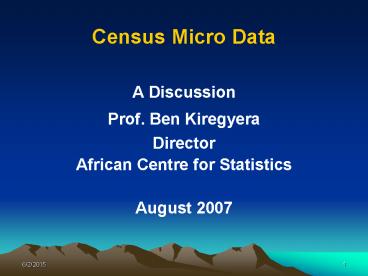Census Micro Data - PowerPoint PPT Presentation
Title:
Census Micro Data
Description:
Title: Slide 1 Author: Gallelli_J Last modified by: Kiregyera Ben Created Date: 11/10/2004 9:57:06 AM Document presentation format: On-screen Show Company – PowerPoint PPT presentation
Number of Views:39
Avg rating:3.0/5.0
Title: Census Micro Data
1
- Census Micro Data
- A Discussion
- Prof. Ben Kiregyera
- Director
- African Centre for Statistics
- August 2007
2
- COVERAGE
- Value of data and information
- Issues arising from presentations
- Conclusion
COVERAGE
3
I. VALUE OF DATA AND INFORMATION
- data and information now universally
- recognized as
- part of the enabling environment for
- development
- a priority for results-based agenda
- (PRSPs, MDGs, etc) (e.g. Marrakech
- Roundtable, 2004)
- data and information have no intrinsic value
- they are not gold or silver. They have
- extrinsic value which lies in their power
to - inform processes e.g. policy debate
- design, planning, monitoring, etc.
- their value lies in fact that
- they can reach those who need them,
- can be easily understood
- are usable and actually used
4
LIS-based research has catalyzed changes in
national policies (LIS paper)
5
DATA CYCLE
Planning
Stage 1
Stage 2
Implementation
Dissemination
Feedback
Stage 3
Reporting
Processing
Analysis/Interpretation
6
- More and more data
- Need information from this
- these data
7
Policy-related information
8
Data, Information, Knowledge, Actions
Informed Actions/ decisions
Knowledge
Value addition
Information
Data
9
- Who should do data analysis?
- Preliminary or general analysis
- statisticians/data producers (NSO)
- Definitive or in-depth or detailed analysis
- subject-matter specialists
- researchers
- Importance of involving subject-matter
specialists and - researchers in analysis
- enriches analysis by adding subject-matter
- perspectives
- possibility to link policy variables to
micro-level - outcomes (paper on LIS)
- enhances collaboration (advancing from
- coordination to collaboration)
- spreads ownership of statistical products
- feedback and advocacy
10
Basic principle of data analysis
Once
Data Collection
Feedback
Many times
Data Analysis
- NSO
- Policy analysts
- Researchers
- Students
- etc.
11
II. ISSUES ARISING FROM PRESENTATIONS
- All presentations make a case for enhancing data
management including - Country level we see great need for
- data archiving (IPUMS-International)
- creation of user-friendly and accessible
- databases (documentation crucial -
metadata) - Benins Jupiter
- ensuring that databases are not empty boxes or
- have garbage
- encouraging researchers to do more detailed
data - analysis (Benin example shows need for
this) - a lot of value in doing broad range of
analysis - (through space and time)
12
- ISSUES ARISING FROM PRESENTATIONS (ctd)
- Challenges
- i) appreciation of value of data (by data
producers and users) - Users use data for evidence-based policy
(debate, design) - decision-making invest more to build
statistical capacity - development
- Producers ensure data quality
relevance better data - management
- inconsistencies through time caused by changes
in - definitions(1992 2002 Benin censuses)
- - special attention to harmonization to
permit comparability - technical capacity (Benin paper mutually
beneficial TA) - Statistics Acts which are not congenial
- Other laws (e.g. designating areas as rural or
urban)
13
- International level we see increasingly
- construction of cross-national micro databases
to - enhance research infrastructure
- Integrated European Census Microdata (IECM)
- Luxembourg Income Study (LIS)
- Redatam Software for micro data dissemination
- analysis
- IPUMS-International initiative archiving,
- integration and disseminate high-density
census - micro data samples
- defining features of these databases include
- research centres not only involved in data
- analysis but also in coordination,
dissemination - and harmonization activities (IECM)
- interest and cooperation of NSOs
- emphasis on integration documentation
- - IECM major part of project
- - IPUMS International
(post-harmonization)
14
Creating databases become a driver for data
harmonization and integration
15
- Challenges
- reliability and comparability of data sources
across - countries
- lack of consistency, terminology,
classifications, - question numbers and wording (all papers)
- confidentiality (strict conditions set by
countries more) - ownership (IPUMS - International)
- dissemination
- Redatam developed by CELADE, Popn. Division
- of ECLAS (UN) allows on-line processing of
any - database over Internet
- LIS uses remote-access system (primary means
- to access data)
- IPUMS posts census documents on Internet, etc
16
- Other issues
- improved analytical capacity at NSOs
- training institutions should strike a
productive - balance between data demand and data
- supply in training programmes
- bigger dose of data analysis in training
centres
17
III. CONCLUSION
- Case made by all papers about need to add
value to data - through more detailed analysis
- Papers urge NSOs to move away from risk
avoidance to - risk management (European
statisticians) - Enhance research infrastructure by creating
user-friendly - databases including micro databases
- Issues to address include integration,
harmonization, - confidentiality
18
Thank You































